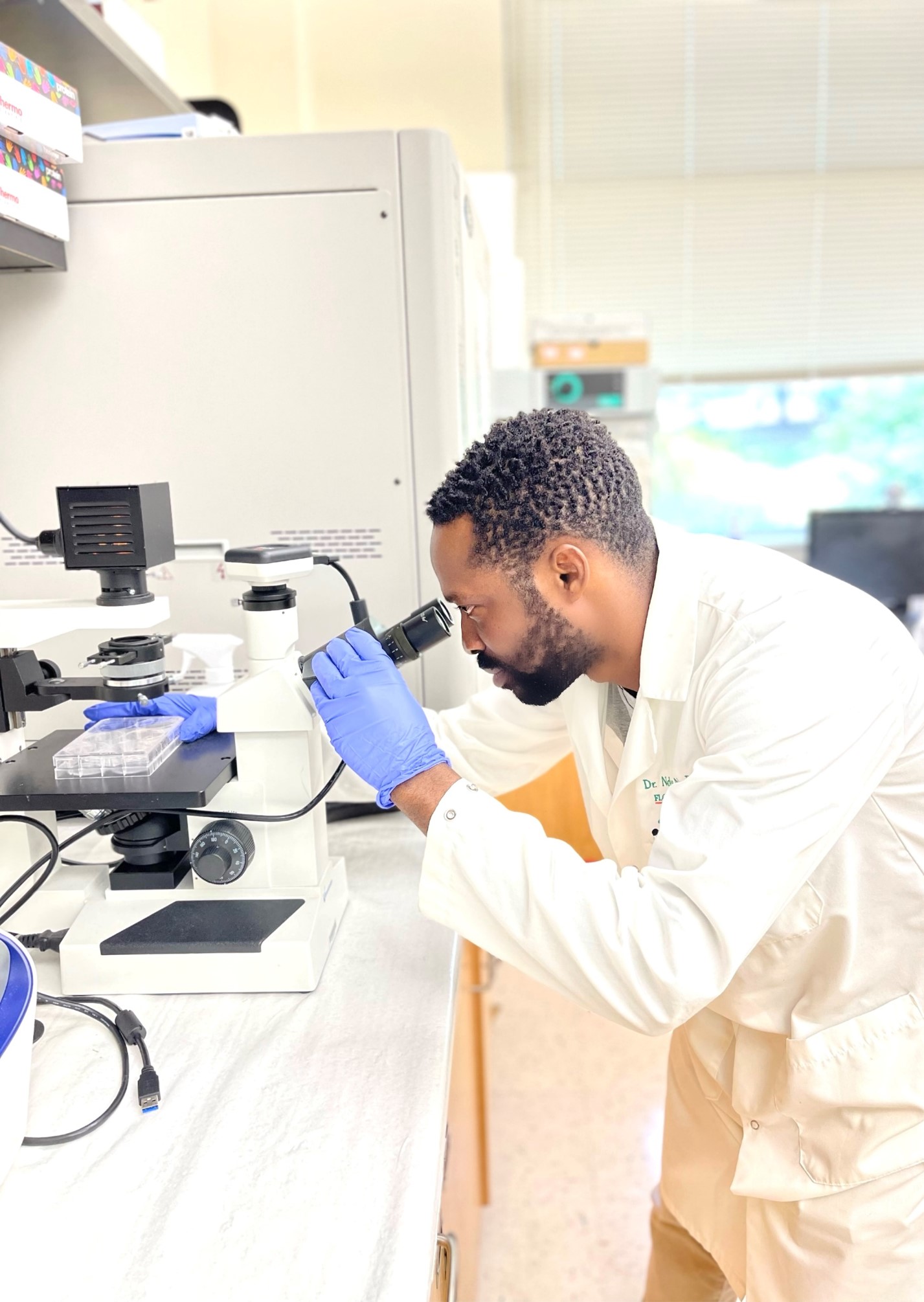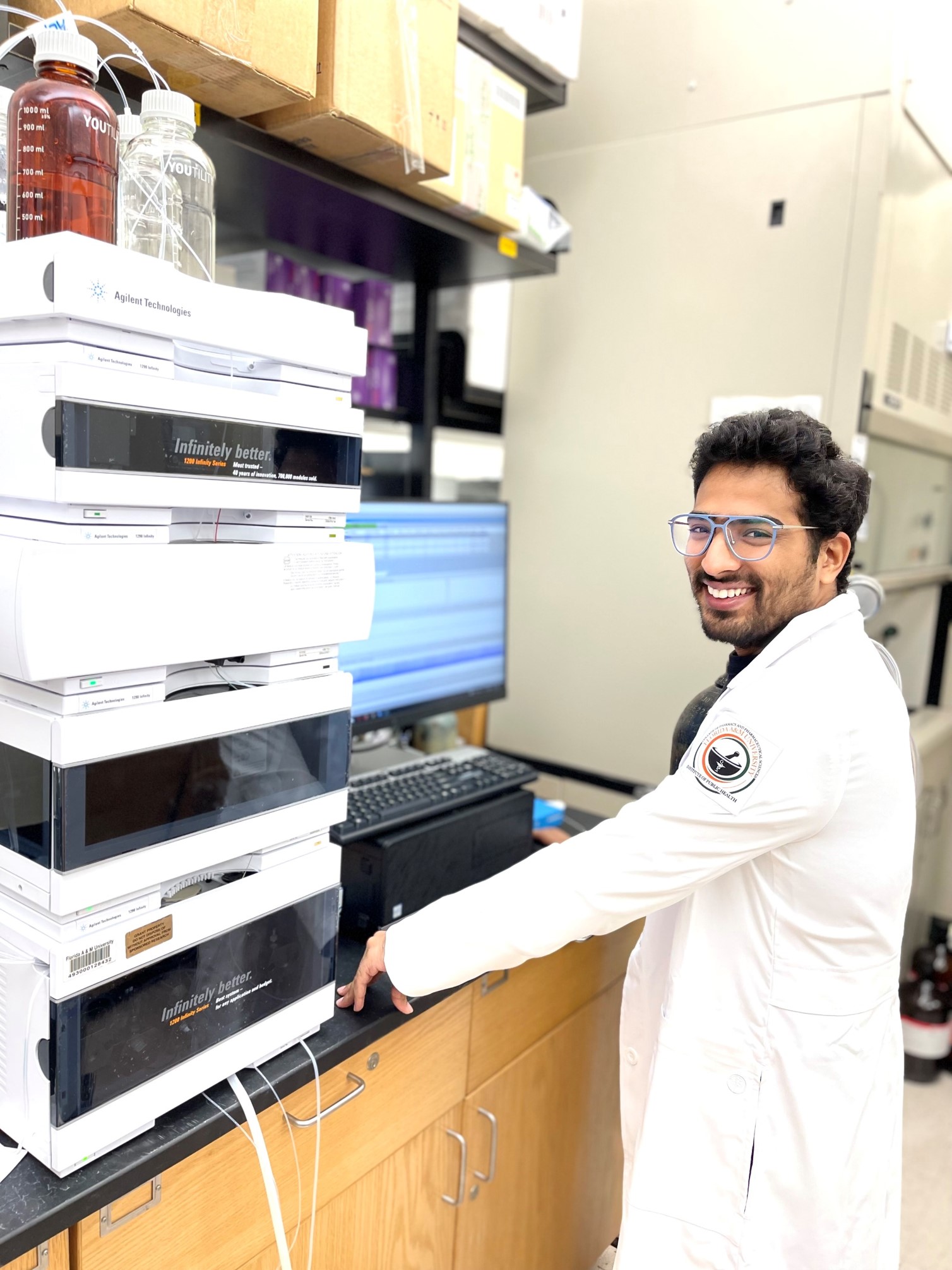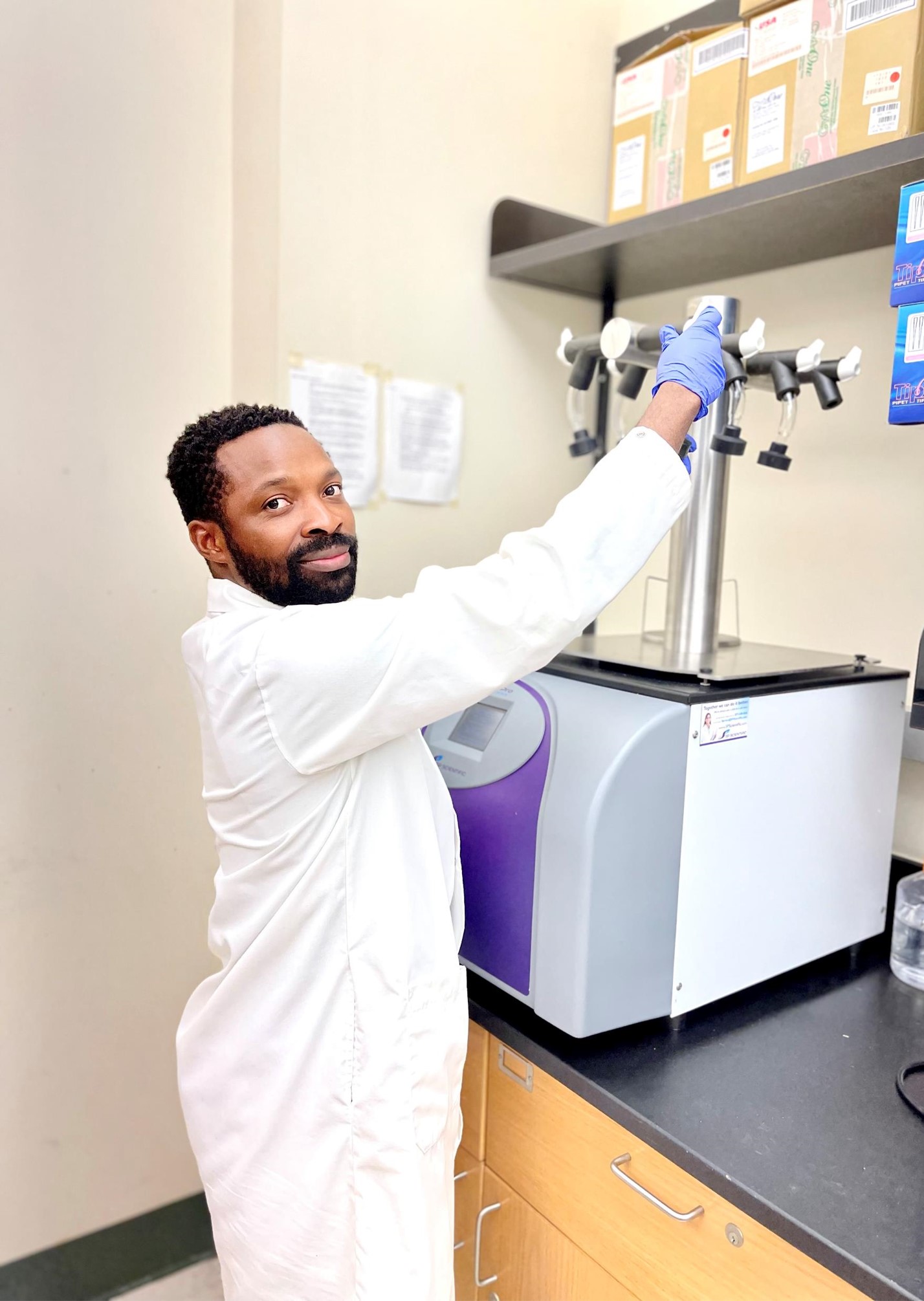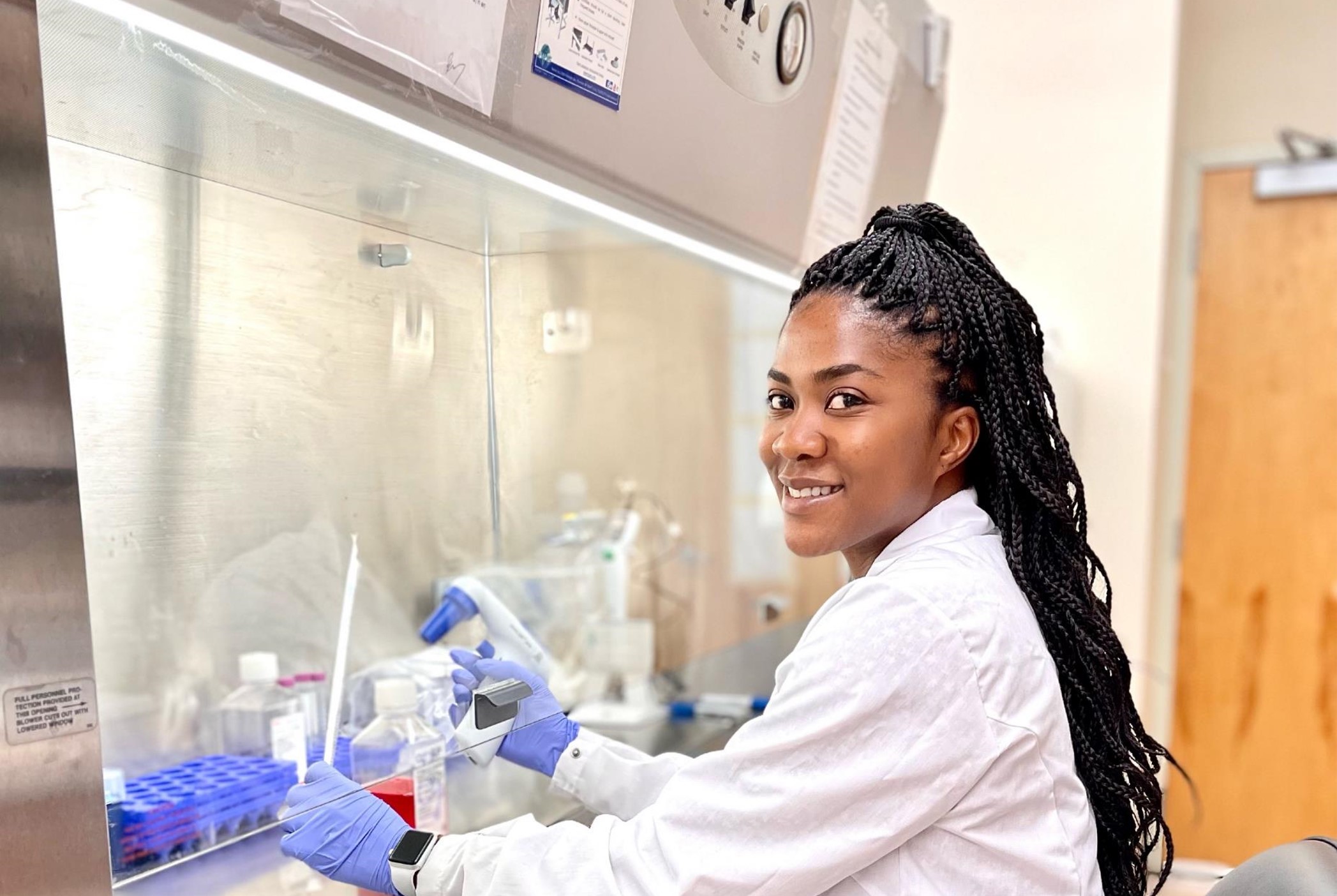Agyare Laboratory
Our Research
Our laboratory works with a variety of nanoparticles for imaging and chemotherapy. We previously loaded Magnevist®, a contrast agent, into liposomal nanoparticles for magnetic resonance imaging (MRI) of pancreatic cancer in vivo and performed the first comprehensive biodistribution and pharmacokinetic analysis of such a nanoprobe. We also developed techniques to enhance the signal-to-noise ratio of tumor-imaging using such nanoprobes.
Our previous work with drug delivery systems has focused extensively on using gemcitabine loaded-thermosensitive liposomal nanoparticle-mediated hyperthermia to sensitize tumors to gemcitabine and defined a novel dual mechanism of action involving anti-hypoxic and vascular disrupting properties of this approach. In anticipation of the clinical translation of this paradigm, our laboratory develops a theranostic nanoparticle that combines a contrast agent and a modified existing anticancer agent as one unit that would have the ability for early detection and tumor growth suppression.
Lab Profile
A Nanotechnology and Pharmaceutics Lab
The best cancer drug is non-beneficial if it never hits the bull’s eye. That is why Dr. Agyare’s lab has tested ways to verify that drugs intended to treat pancreatic cancer and other cancers reach their targets.
Dr. Agyare’s lab is working to surmount this defense by developing novel nanoparticles with dual action. These nanoparticles contain modified anticancer prodrugs, gadolinium (a contrast agent that researchers can track in the body using MRI), and are coated with a ligand to bind to tumor cells. An animal’s system typically metabolizes contrast agents, making them helpful in verifying if the drugs reach their target.
Dr. Agyare’s lab has also tested this approach in PDX mouse models. A portion of this research, which Dr. Agyare conducts with collaborators, involves DNA sequencing. The team sequences the genomes of tumors removed from human patients and implants those tumors in mice. Subsequently, the team treats the rodents with modified anticancer compounds or analogs in a nano-delivery system (loaded with drug and contrast agent), then observes the varying results using MRI and other tools.
The goal is to observe how tumors with different genetic makeup form and respond to tumor suppression. The ultimate goal is to use the knowledge derived from these studies to develop an advanced delivery system that can be significantly translated to the clinic.
Collaborators
Associate Professor, Hematology/Oncology
Members of the Agyare Laboratory

BIOSKETCH Edward Agyare, Ph.D.
Division Director & Professor of Pharmaceutical Sciences
Ph.D., Pharmaceutics, Florida A&M University College of Pharmacy and Pharmaceutical Sciences, Institute of Public Health
- Postdoctoral Fellow: The University of Texas, MD Anderson Cancer Center, Houston, Texas.
- Visiting Fellow: Mayor Clinic Graduate School, Rochester, MN.
- Visiting Scientist: The University of Texas, MD Anderson Cancer Center, Houston, Texas
- Drug Delivery
- Tumor Targeting
- Nanotechnology and Nanomedicine
- Mechanisms of nanotechnology-based modified anticancer drug delivery, with emphasis on understanding how various biological barriers influence the effectiveness of delivery systems.
- Development of theranostics for the early diagnosis and treatment of pancreatic and colorectal cancers.
- Ndemazie, N. B., Inkoom, A., Morfaw, E. F., Smith, T., Aghimien, M., Ebesoh, D., & Agyare, E. (2022). Multi-disciplinary approach for drug and gene delivery systems to the brain. AAPS PharmSciTech, 23, 1-21.
- Ndemazie, N. B., Inkoom, A., Ebesoh, D., Bulusu, R., Frimpong, E., Trevino, J., ... & Agyare, E. (2022). Synthesis, characterization, and anticancer evaluation of 1, 3-bistetrahydrofuran-2yl-5-FU as a potential agent for pancreatic cancer. BMC cancer, 22(1), 1-16.
- Inkoom, A., Ndemazie, N., Affram, K., Smith, T., Zhu, X., Underwood, P., Krishnan, S., Ofori, E., Han, B., Trevino, J. & Agyare, E. Enhancing efficacy of gemcitabine in pancreatic patient-derived xenograft mouse models. Int J Pharm X 2, 100056, doi:10.1016/j.ijpx.2020.100056 (2020).
- Smith, T., Affram, K., Nottingham, E. L., Han, B., Amissah, F., Krishnan, S., Trevino, J. & Agyare, E. Application of smart solid lipid nanoparticles to enhance the efficacy of 5-fluorouracil in the treatment of colorectal cancer. Sci Rep 10, 16989, doi:10.1038/s41598-020-73218-6 (2020).
- Smith, T., Affram, K., Bulumko, E. & Agyare, E. Evaluation of in-vitro cytotoxic effect of 5-FU loaded-chitosan nanoparticles against spheroid models. J Nat Sci 4 (2018).Affram, K., Udofot, O., Singh, M., Krishnan, S., Reams, R., Rosenberg, J. & Agyare, E. Smart thermosensitive liposomes for effective solid tumor therapy and in vivo imaging. PLoS One 12, e0185116, doi:10.1371/journal.pone.0185116 (2017).
- Affram, K., Smith, T., Helsper, S., Rosenberg, J. T., Han, B., Trevino, J. & Agyare, E. Comparative study on contrast enhancement of Magnevist and Magnevist-loaded nanoparticles in pancreatic cancer PDX model monitored by MRI. Cancer Nanotechnol 11, doi:10.1186/s12645-020-00061-9 (2020).
- Affram, K. O., Smith, T., Ofori, E., Krishnan, S., Underwood, P., Trevino, J. G. & Agyare, E. Cytotoxic effects of gemcitabine-loaded solid lipid nanoparticles in pancreatic cancer cells. J Drug Deliv Sci Technol 55, doi:10.1016/j.jddst.2019.101374 (2020).
- Udofot, O., Affram, K., Smith, T., Tshabe, B., Krishnan, S., Sachdeva, M. & Agyare, E. Pharmacokinetic, biodistribution and therapeutic efficacy of 5-fluorouracil-loaded pH-sensitive PEGylated liposomal nanoparticles in HCT-116 tumor bearing mouse. J Nat Sci 2 (2016).
- Agyare, E. K., Leonard, S. R., Curran, G. L., Yu, C. C., Lowe, V. J., Paravastu, A. K., Poduslo, J. F. & Kandimalla, K. K. Traffic jam at the blood-brain barrier promotes greater accumulation of Alzheimer's disease amyloid-beta proteins in the cerebral vasculature. Mol Pharm 10, 1557-1565, doi:10.1021/mp300352c (2013).
- Udofot, O., Affram, K., Israel, B. & Agyare, E. Cytotoxicity of 5-fluorouracil-loaded pH-sensitive liposomal nanoparticles in colorectal cancer cell lines. Integr Cancer Sci Ther 2, 245-252, doi:10.15761/icst.1000150 (2015).
Contact Us
Edward Agyare, Ph.D.
Principal Investigator
Division Director & Professor of Pharmaceutical Sciences
|
| Florida A&M University College of Pharmacy and Pharmaceutical Sciences, Institute of Public Health Tallahassee, FL 32307 |
| Phone: (850) 599-3581 |
| edward.agyare@famu.edu |











